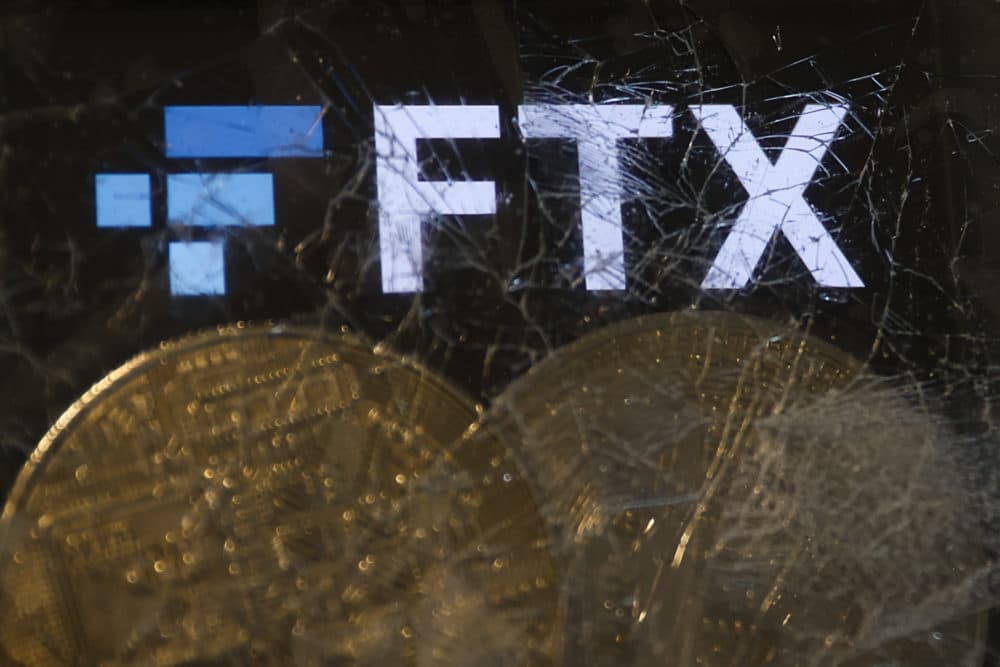Advertisement
Blockchain industry may cool following FTX collapse, but many are betting not for long

The spectacular fall of FTX, once the second-largest cryptocurrency exchange in the world, is yet another black eye for blockchain, a growing tech industry in Massachusetts.
The crash happened after revelations that FTX used customer funds to make risky bets without proper collateral. The bombshell wiped out nearly $150 billion in digital currency.
Many investors now worry they have lost all the money they placed with FTX, which froze accounts and has filed for bankruptcy.
Cryptocurrencies, like Bitcoin, are built on a technology called blockchain, which is essentially a record of transactions maintained across a network of computers. It allows users to make digital transactions without an intermediary, like a bank. According to an estimate from state lawmakers, the blockchain industry in Massachusetts was worth about $12 billion as of June.
When scandals like the one involving FTX happen, people in the industry brace for a backlash.
"I think like everybody, I was kind of in shock," said Steve Derezinski, who co-founded Hashchat.xyz, a company that uses blockchain to send encrypted messages. "I think it's going to have a chilling effect on the overall excitement about that area."
While cryptocurrencies are not the only way to use blockchain, people who are unfamiliar with the technology tend to conflate the two, said Derezinski. He hopes once the initial shock of the FTX flame-out wears off, more people will pay attention to blockchain projects beyond cryptocurrencies.
"I think there's still a lot of people who are ready to build and create new things," he said.
Representative Kate Lipper-Garabedian, a democratic state lawmaker from Melrose, said she's convinced that blockchain is here to stay.
"There are many other practices in which it can be deployed that are going to be critical, and frankly, become integrated into the way we do business," she said.
Some examples include the potential to authenticate and safely store legal documents, she explained.
Lipper-Garabedian recently filed a bill that would create a legislative commission on blockchain. If it passes, the commission would be tasked with creating recommendations for "appropriately supporting the industry." That is likely to include funding for education and workforce training in blockchain technology.
Lipper-Garabedian acknowledges that events like the FTX scandal, following other crypto scandals, add to the pressure on lawmakers to regulate the industry. She expects state lawmakers to file more bills related to blockchain in future legislative sessions.
Blockchain enthusiasts have traditionally been skeptical of government regulation, but the recent crashes have softened many people's views. Investors, in particular, are not usually fans of unstable markets.
"No one's saying, 'Let us do whatever we want,' " said Giuseppe Stuto, the co-founder of 186 Ventures, which has invested in several local blockchain startups. "People are saying, 'Tell us what we can and cannot do with clarity, please.' "
In the short term, Stuto said he expects a lot of bigger investors to pull back their investments in new blockchain ventures. Longer-term, he believes more scrutiny from investors will lead to more viable blockchain businesses.
"I actually think a lot of positive will come once the dust settles," he said. "People are going to ask themselves what's worth working on and building, so there's going to be much more of an intense focus on the right areas."
Rob Sarnie, who spent 23 years at Fidelity and now teaches financial technology at Worcester Polytechnic Institute, expects a shift in the role of digital currencies. Sarnie said the proliferation of scams is likely to discourage more people from using cryptocurrency as a speculative asset or get-rich-quick scheme.
"I'm about where's the value?" he said. "With my [U.S.] dollar ... I know what it's worth. I know the United States is backing that up." Not so with cryptocurrency.
Sarnie is still convinced the future of currency is digital. But he said that may be in the form of a government-issued digital currency or stablecoins, a type of cryptocurrency pegged to the U.S. dollar.
Boston-based Circle is the second-largest issuer of stablecoin in the world. The value of its currency, USDC, has remained stable despite recent digital currency crashes.
